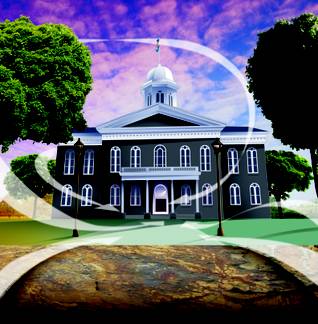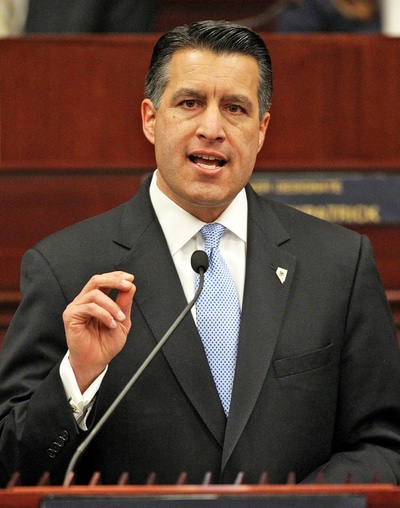Sunday, Feb. 3, 2013 | 2 a.m.
Related Stories
- When it comes to special interests, beat them at their own game (02-03-2013)
- Partisan loyalties, personal ambitions to complicate legislative compromise (02-03-2013)
- Want a real-time window to the Legislature? Follow our Twitter guide (02-02-2013)
- With staff changeover, Sandoval administration loses ties to Legislature (02-01-2013)
- Gun control, death penalty among social issues before Nevada lawmakers (02-01-2013)
- More Sun political news
Nevada legislators launch their biennial session Monday facing the possibility that little will actually happen.
Gov. Brian Sandoval, who has been a cautious head of state, is facing re-election and might have higher political aspirations, making him loath to propose any sweeping, controversial changes. Democratic leadership is afraid to admit they want to raise taxes, and they don’t have the two-thirds majority to raise money by themselves. Republicans don’t control either house — for the third consecutive session — and seem content to follow Sandoval’s careful lead.
On top of that, a fifth of the state’s 63 lawmakers are freshmen — these are folks who are still figuring out where the bathrooms are in the Legislative Building and are leading important policy committees.
Against that backdrop, the 2013 Legislature looks for now to be defined not by big policy pushes or pitched battles over taxes and spending, as have past legislative sessions. Instead, it could be ancillary policy issues and the personalities of untested leadership that dominate the stage.
In fact, it could be viewed as a session of comity. Sandoval, Democrats who control the Legislature and Republican minority leaders say they want to work together. That’s a break from when Sandoval in 2011 and his predecessor Jim Gibbons drew sharply conservative lines on raising taxes, and Democrats pushed big tax plans to fund education, social services and other parts of state government.
Another contributor to the drama of previous legislatures was that Democratic leaders were openly gunning for higher office, casting all their legislative moves through a political lens.
But critics view this year’s bipartisan talk as a way of ducking the big issues facing the state.
Neither Sandoval nor legislative leaders have uttered proposals to address unfunded pension liabilities or health care costs or local government employee bargaining. No bold education proposals to fix the state’s lowest-in-the-nation high school graduation rates have been floated.
And Democrats are still too gun-shy to proclaim their intent to seek tax reform.
But some lawmakers and lobbyists caution that just because the tone might seem more genteel, the Legislature still may tackle the state’s big issues.
Assembly Speaker-elect Marilyn Kirkpatrick has been quietly pushing for an expansion of the state’s sales tax to include services such as haircuts and accounting. Even if done in a revenue-neutral way, by lowering the existing sales tax rate in order to cobble together a two-thirds vote, the broader tax base would substantially shift how the state raises money for education.
It also would set off a fierce political and lobbying fight as every interest group in the state — health care, housing, landscapers and lawyers — tries to rally support to exempt itself from the tax.
“I wouldn’t rule out a major fight, or at least a serious discussion, about restructuring or reorganizing of some of our taxes,” said Jim Wadhams, a veteran lobbyist in Nevada.
Sandoval says he won't support new taxes, but he has not ruled out revenue-neutral options.
As it stands, Sandoval’s budget proposal is moderate, with a little something for everyone and not enough to satisfy those on the right or left.
Under his budget, state general fund spending for the next two years would increase to $6.5 billion from $6.2 billion, an increase of 5.5 percent.
He proposed targeted increases in education programs, such as partially expanding full-day kindergarten in some schools and some programs for English-language learners. But most of the $135 million in increased education funding Sandoval has proposed will be used to address the increasing costs of such things as electricity and growing enrollment. The money he is putting into full-day kindergarten and English-language learning, school districts say, won't replace funding cut since the economy took a dive.
The budget keeps most of the tax increases set to expire this year in place, though Sandoval also proposed a cut in the state’s payroll tax.
Sandoval’s proposed budget also seeks to avoid any of the political fights that may stand in the way of its passing.
That is not by accident. Sandoval doesn't want to jeopardize his impressive approval rating before he’s up for re-election in 2014.
Plus, the governor is boxed in. On his right flank, conservatives stand ready to pounce on any major initiatives that require money. To his left, Democrats control both houses of the Legislature and would likely halt any major conservative reform initiatives.
Pete Ernaut, a lobbyist and adviser to Sandoval, said the governor has “taken a major portion of the policy drama out of the session. The governor’s agenda this session is indicative of the times we live in and the economy we have.”
As for not pushing harder for conservative causes, he said: “Anyone advocating for an enormous fight with organized labor over collective bargaining reform has to learn how to count.”
With both houses controlled by Democrats, “the governor is not going to try to be the next Don Quixote,” Ernaut said.
Democratic leaders can count to two-thirds too, and know they would need Republican votes to pass a tax increase. Those Republicans are currently taking their lead from Sandoval.
Democrats promise to talk about the state’s tax structure early and often. Democrats say education funding is inadequate but won’t say where they’d get more money.
The lack of a firm declaration on raising taxes is frustrating advocates for more spending.
“Of course we find that frustrating,” said Lynn Warne, president of the Nevada State Education Association, which represents teachers. “Caucus leaders are being pretty squishy about what they will consider.”
In the meantime, the teachers union is promoting an initiative to adopt a business margins tax, a potential bypass of the Legislature after decades of frustration.
“We’re not interested in seeing anything that’s revenue neutral,” Warne said. “Our kids, and schools, can’t wait to see what might come down the road years from now.”
She called Sandoval’s proposals on all-day kindergarten and English-language learners “a step in the right direction, but a very small step.”
“Democrats don’t have a two-thirds vote to do a major tax, and don’t seem to have the appetite to do it,” said Tray Abney, director of government relations for the Chamber of Commerce for Reno and Sparks.
On the right, conservative anti-tax lawmakers have been co-opted by Sandoval, meaning they likely will have a sizeable influence this session.
Historically, Republicans in the Legislature have tried to trade their support of a tax increase for Democratic support on their issues: restricting collective bargaining for public employees, changing the construction defect process and reducing the prevailing wage scale for workers on public works projects. But with Sandoval and Republican leaders issuing a blanket opposition to a tax increase, Democrats are in a weakened bargaining position.
In 2011, when the state passed some education reforms to change the teacher tenure and evaluation process, “Democrats crossed a core constituency group. Republicans didn’t,” Abney said.
“Democrats were braver than Republicans in 2011,” he added. “I don’t see (Democrats) having the appetite to do that again, without major concessions from the other side of the aisle.”
But for some, a mellow session isn’t just pragmatic politics. It could be refreshing.
“Both parties have a lot to gain from having a productive legislative session with less partisan acrimony and difficulty,” said Mike Hillerby, a lobbyist who worked on then-Gov. Kenny Guinn's staff. “Both parties know they can separate themselves from everything the public doesn’t like about Congress and Washington by coming here, working hard and doing the people’s work.”
It’s a break from the ideological clashes of those who think the education system and social safety net need more money, and those who believe businesses can’t stomach more taxes.
So, simply allowing the state to continue limping through an economic recovery may be the best option, some say.
“Both sides know there’s little to be gained by blowing up the process and damaging the process,” Hillerby said. “The public already has a strained faith in the process.”



Join the Discussion:
Check this out for a full explanation of our conversion to the LiveFyre commenting system and instructions on how to sign up for an account.
Full comments policy